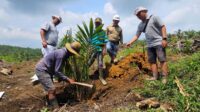PALMOILMAGAZINE, JAKARTA — The Indonesian government has officially mandated that all independent smallholder oil palm farmers obtain Indonesian Sustainable Palm Oil (ISPO) certification by March 2029. The requirement is outlined in Presidential Regulation (Perpres) No. 16/2025, signed on March 19, 2025, replacing Perpres No. 44/2020.
The Indonesian Sustainable Palm Oil Farmers Forum (FORTASBI) warned that the four-year transition period is relatively short and stressed the need for large-scale farmer assistance.
In a statement cited by beige-heron-208544.hostingersite.com on Tuesday (August 12, 2025), FORTASBI highlighted the importance of strong collaboration between government, industry players, farmer organizations, and NGOs to accelerate certification. Among its key recommendations is the provision of incentives for smallholders, who often struggle with certification costs, farm infrastructure upgrades, and technical training.
Also Read: Smallholders Encouraged to Measure Carbon Emissions: FORTASBI Holds Training in Pekanbaru
Such incentives—whether financial aid, technical assistance, or broader market access—could help overcome these barriers. FORTASBI added that they would also encourage farmers to adopt sustainable practices, such as the use of organic fertilizers, waste management, soil and water conservation, and the prohibition of land burning. Compliance with ISPO principles and criteria is expected to curb deforestation and reduce the risks of haze and environmental degradation.
The government has several funding instruments that could be mobilized to support this effort, including allocations from the Palm Oil Plantation Fund Management Agency (BPDPKS), Special Allocation Funds (DAK), Palm Oil Revenue-Sharing Funds (DBH Sawit), as well as grants from ministries and local governments.
These mechanisms could be used to cover certification audit fees, develop plantation infrastructure, provide Good Agricultural Practices (GAP) training, and extend low-interest loans. On the non-financial side, intensive field assistance, expert deployment, and farmer organization strengthening are seen as crucial to ensuring Indonesia achieves its 2029 ISPO compliance target. (P2)





































